小学英语六上第六单元复习课课件
上海市小学六年级第一学期英语(牛津上海版)教材教案课堂单词记忆课件(例句版)Unit 6 Going to school

来源:lot源自中古英语的hlot,意为抽签用的木片。
词组:a lot of cars 很多车 a lot of sheep 一群羊
例句:They make a lot of money. She gets a lot of information.
来源:源自古英语的hwenne,意为何时。
例句:When are we leaving? When are you going home?
词组: five star hotel 五星级宾馆 stay at/in a hotel 住宾馆
例句:I’ve booked the flights and the hotel. The hotel is now open to guests.
构成: ad+vert+ise+ment=advertisement
构成:fer+ry=ferry fer-: 词根:带来 -ry: 名词后缀 “带来带去的东西”→“渡船”
词组: by ferry 乘渡船,乘渡轮
ferry terminal 渡轮码头 例句:When does the next ferry leave? You can cross the river by ferry.
来源:源自中古英语的fewe;最初源自古英语的feawa, 意为少,少的。
词组:a few minutes 几分钟 a few of people 几个人
例句:He found a few coins in the car. I only know a few Chinese characters.
提示:本演示文稿采用Microsoft office PowerPoint 2013 制作,PPT动画特效在其他软件播放可能出现失真。
人教版小学英语六年级上册Unit 6教学 PPT课件 图文
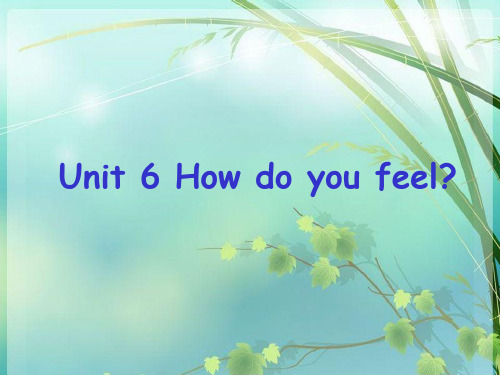
It's cold outside. Sam is talking with Sarah.
Listen and circle.
1.Where are they?
A.At home.
B.At school.
2.What will they do?
A.Eat some fruit.
B.Watch films.
Let's talk
Sam:What's this cartoon about? Sarah:It's about a cat. The cat is a police officer.
Sam:Cool! Sarah:He chases the mice. They're afraid of him.
4
3
1
2
Fill in the blanks and retell the story.
The ant is _a_f_ra_i_d_. Robin is stuck and __w_o_r_ri_e_d__.
The ants are strong.They _pu_l_l _R_ob_i_n_o_u_t_o_f_t_h_e_m_u_d_. Now everyone _is__h_ap_p_y___.
2.They're afraid of him. 它们害怕它。
3.The cat is angry with them. 这只猫很生它们的气。
4.Don't be sad. 别伤心。
小练习
一、根据所给词或上下文提示填空。 1. I am afraid of __ch_a_s_in_g___ (chase) snakes. 2. There are a lot of _m__ic_e__ (mouse) under the ground. 3. Amy is angry __w_it_h__ me. Because I broke her favourite toy. 4. How _d_o___ (do) they feel? 5. -How _d_o_e_s_ (do) Jack feel? -He _f_ee_l_s_ (feel) sad.
人教版新课标PEP小学英语六年级上册Unit6 说课稿(第2课时)

人教版新课标PEP小学英语六年级上册Unit6 说课稿(第2课时)Unit 6 The Story of Rain本课是六年级上册第六单元的第二课时,即Unit6 The story of rain Part A Let’s talk.该单元是一个阅读单元,主要学习与自然现象和种植相关的一些单词,了解自然界水循环的过程和植物种植过程的表达,教学内容比较抽象,是英语学科与自然学科的渗透整合。
本节课主要是帮助学生听懂Let’s try 部分的录音,并正确写出标号,通过听说认读Let’s talk部分的对话,能用英语简单表达自然界水的循环过程。
这节课主要引导学生在认读对话的过程中了解水的循环过程,并尝试用英语简单表达水的循环过程,同时提醒学生关心世界性问题——地球水资源的缺乏,认识水的重要性,增强自然环境保护意识,注意保护水源、节约用水。
二、Learner Analysis六年级的学生已经具备了一定的英语基础,在以前的学习中也已经接触到了一些与自然界相关的一些单词,但在此之前学生还没有学过用英语表达某一种自然现象,关于水的循环过程学生在其他的学科中也有所了解,而且在本单元的主情景图中已经简单了解过,因此理解的难度不是太大,但对话中涉及到的两个生词become / shine 及相关的句子,是学生在表达时的一个难点,要创设具体语言情境引导学生感知理解,并通过趣味性的操练帮学生达到熟练表达。
三、Teaching aims根据教材的编排意图和学生的实际情况,结合新课标对高年级学生的具体要求,制定如下教学目标:1.能听懂Let’s try 部分的录音内容,完成标号练习。
2. 能听说认读本课对话,了解水的循环过程。
3. 能听说读写粗体句子,并熟练掌握主要句型:Where does the … come from? It comes from the ….4.能用英语简单描述自然界水的循环过程。
在外语教学中,学生只有在真实的语言情景或模拟情景中才能更好地理解所传递的信息和语言材料,才能激活学生的思维,从内心产生表达思想、展示自我的欲望。
小学六年级英语复习课《祈使句》精品教学课件
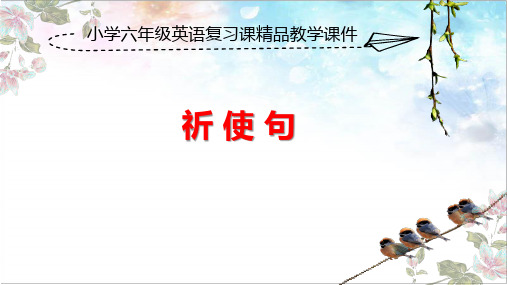
口诀: 使用祈使句,表示请求、命令或建议。 动词原形做开头,主语是you要省去。 句首Don't加动原,表示否定要注意。 Let's not加原形,也是一种否定句。 单词please表客气,句首句末没关系。
课堂练习:单项选择。
—____A____ help you.
—Thank you!
A.Let me
二、根据情景,选择正确的答案。
( )1.这里禁止吸烟,你应这样提醒大家:________
A.No parking!
B.No smoking!
C.No car!
( )2.在英语课上,老师对你说:________
A.Shout loudly, please. B.Read after me, please. C.Clean the room, please.
C.Go; turning
( )10.It's cold.________ the window, please.
A.Don't open
B.Don't cl要求完成下列句子。 1.You should keep the classroom clean.(改为祈使句) ________________________________________________________________________ 2.You can sit on the yellow chair.(改为祈使句) ________________________________________________________________________ 3.You must do your homework carefully.(改为祈使句) ________________________________________________________________________ 4.Take off your coat.(改为否定句) ________________________________________________________________________ 5.Water the flowers in the garden.(改为否定句) ________________________________________________________________________
武都区实验小学六年级英语上册 Unit 6 How do you feel第四课时B Let’s t

第四课时课时内容B Let’s try; Let’s talk课时分析本课时是人教版六年级上册第六单元第四课时,与第三课时紧密相连。
继续围绕“疏导他人情绪、提出建议”的话题展开,主要通过对话学习询问他人状况的句型What’s wrong?及提出建议的句型Don’t ... ... should...并对学生进行不能以自我为中心,要关心他人,为他人着想的德育教育。
第三课时中句型...should...的学习,为本课时起到了铺垫的作用。
本课时的重点是核心句型的运用。
本课时包括Let’s try和Let’s talk两个版块。
Let’s try通过Sarah父母对话的场景呈现了Let’s talk版块的人物和场景信息。
Let’s talk版块通过Sarah, Sam和母亲的对话,让学生感知He should... Don’t ...的语义和语用情景。
此版块讲述的是Sarah的父亲生病,不能带他们去公园的事情。
情景真实,有教育意义,很能激起学生学习的兴趣。
在设计本课教学过程时,我首先采用游戏、认读词组的方法,帮助学生回忆和巩固上节课的知识,然后采用整体感知对话、局部处理语言、模仿对话的方法学习对话,最后用表演对话、角色扮演等方法巩固对话。
课时目标1. 能够理解对话大意。
2. 能够用正确的语音、语调朗读对话。
3. 能够听、说、读、写句型:He should see a doctor. Don’t be sad.4. 能够在情景中运用句型Don’t ... ... should...提出建议。
5. 能够使用What’s wrong?询问他人状况。
6. 对学生进行不能以自我为中心,要关心他人,为他人着想的德育教育。
课时重难点1. 重点(1)能够理解对话大意。
(2)能够听、说、读、写句型:He should see a doctor. Don’t be sad.(3)能够在情景中运用句型Don’t ... ... should...提出建议。
译林小学英语六年级上册第六单元课件

our city. We can put rubbish in the bin. Liu Tao: We can plant more trees. They help keep the air clean. Miss Li: Your ideas are great. Well done, class!
S_m_o_k_e_ from cars and _b_la_c_k _S_m__o_k_e from f_a_c_t_o_ri_e_s
the air
_R_u_b_b_i_s_h_
make(s)
the streets dirty.
__R_u_b_b_i_s_h_ in the _w_a_t_e_r
the river
_________ in the _____
the river
What makes the street messy and dirty?
Miss Li: Look at these pictures of our city.
Is our city clean?
Students: No, it isn’t. Is it right?
河
空气
chair
Why do the birds don’t like the city?
Because the city is messy and dirty.
thirty
What makes the city messy and dirty?
是什么造成这r个ub城be市r 又fi乱sh又脏?
小学六年级英语语法总复习PPT课件

• 小学阶段不规则动词全表
• Infinitive Past tense Infinitive
• 1. am, is
was
2. keep
• 3.are
were
5. make made
4.become
7. blow
blew
8. read
• 9. buy
bought
10. ride
• 11. catch caught
fly-flying walk-walking
jump-jumping sleep-sleeping
climb-climbing fight-fighting
swing-swinging drink-drinking catch-catching pick-picking
watch-watching play-playing
dance danced
变y为 i+ed
study studied
动词的过去式(不规则)
go-went read-read eat-ate sing-sang take-took buy-bought see-saw swim-swam am,is-was do-did are-were have-had get-got leave-left fly-flew stop-stopped(双写)
.
• 一般现在时的变化
1. be动词的变化。
否定句:主语+ be + not +其它。 如:He is not a worker.他不是工人 一般疑问句:Be +主语+其它。 如:-Are you a student? -Yes. I am. / No, I‘m not. 特殊疑问句:疑问词+一般疑问句。如:Where is my bike?
小学六年级英语语法复习ppt课件

.
.
.
.
• 写出下列各词的复数 I _________him _________this ___________her ______ watch _______child _______photo ________diary ______
man______ woman_______ paper_______ juice___________ water________ milk________ rice__________ tea__________
.
• 2.行为动词:主语+行为动词(+其它)。如: We study English.我们学习英语。 当主语为第三人称单数(he, she,it)
时,要在动词后加"-s"或"-es"。如: Mary likes Chinese.玛丽喜欢汉语。
.
• 二、用括号内动词的适当形式填空。 1. He often ________(have) dinner at home. 2. Daniel and Tommy _______(be) in Class One. 3. We _______(not watch) TV on Monday. 4. Nick _______(not go) to the zoo on Sunday. 5. ______ they ________(like) the World Cup?
• 6, 用在序数词,方位词前和形容词最高级前, the first , the east, the tallest
.
• 3、零冠词(不用定冠词) (1)名词前已有作定语用的this, that, these, those, my, your, his, her, our, their, some等限 定词时,不用冠词。如:this eraser, her pencilbox, some boxes, those women等。 (2)泛指的不可数名词前一般不用冠词。如:meat, rice, water, bread, tea, milk, juice等。 (3)复数名词表示泛指时,不用冠词。如: the people in the room are doctors. 房间里的那 些人是医生。 (4)在表示学科的名词前一般不用冠词。如: Chinese, English, math, physics, history等。在 三餐饭和球类运动名词前一般不加冠词。如:have breakfast/ lunch/ supper, play basketball/ football等。 (5)在季节、节日、星期、月份前不用冠词。如: autumn, summer, winter, spring, Teachers’ day, Children’s day, Sunday, February等。 (6)在表颜色、语种和国家名词前不用冠词。如: white, brown, French, Australia等。 (7)在表示称呼语的名词之前,以及职务、头衔的 名词前不用冠词。如:Docto.r green is a scientist. 格林博士是位科学家。
人教PEP版六年级英语上册《Unit6》精品教案教学设计小学优秀公开课
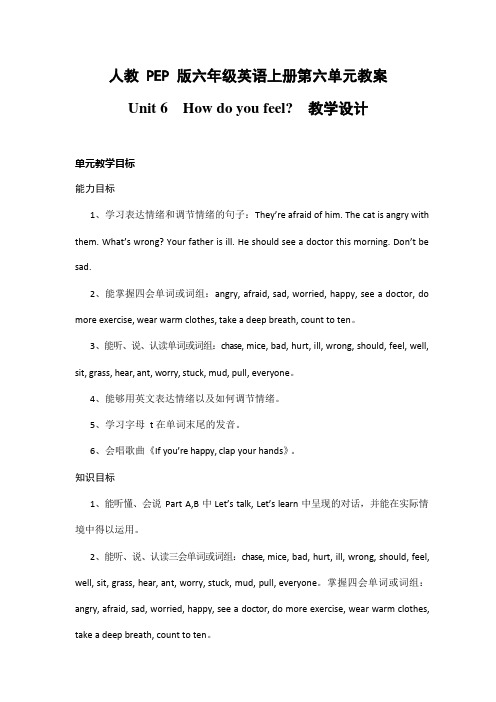
人教 PEP 版六年级英语上册第六单元教案Unit 6 How do you feel? 教学设计单元教学目标能力目标1、学习表达情绪和调节情绪的句子:They’re afraid of him. The cat is angry with them. What’s wrong? Your father is ill. He should see a doctor this morning. Don’t be sad.2、能掌握四会单词或词组:angry, afraid, sad, worried, happy, see a doctor, do more exercise, wear warm clothes, take a deep breath, count to ten。
3、能听、说、认读单词或词组:chase, mice, bad, hurt, ill, wrong, should, feel, well, sit, grass, hear, ant, worry, stuck, mud, pull, everyone。
4、能够用英文表达情绪以及如何调节情绪。
5、学习字母t 在单词末尾的发音。
6、会唱歌曲《If you’re happy, clap your hands》。
知识目标1、能听懂、会说Part A,B 中Let’s talk, Let’s learn 中呈现的对话,并能在实际情境中得以运用。
2、能听、说、认读三会单词或词组:chase, mice, bad, hurt, ill, wrong, should, feel, well, sit, grass, hear, ant, worry, stuck, mud, pull, everyone。
掌握四会单词或词组:angry, afraid, sad, worried, happy, see a doctor, do more exercise, wear warm clothes, take a deep breath, count to ten。
小学英语六年级毕业考试复习课件 专题六 交际用语 问路、指路(小声初)PPT课件
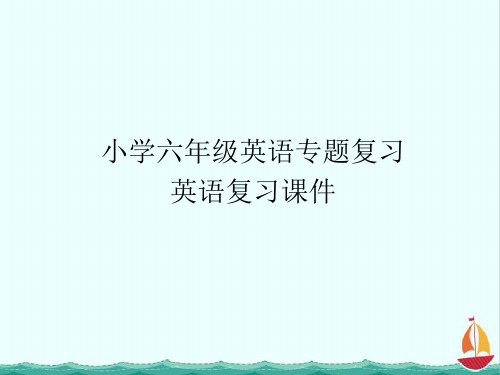
The entrance is on your left.
Read maps
Turn left when you come to the corner of the road
Cross the road
Walk along this road.
Cross the road . The entrance is in front
beside the bank / next to the bank on the left of the bank
Park
Post office
across from the park
Road signs
turn right
turn left
straight on
zebra crossing
You must wait.
行三分钟即到。 • Cross the street, walk on and take the second turning
on the right, it’s three minutes’ walk. • 非常谢谢。 • Thanks a lot. • 不用谢。 • Not at all.
Summarization
You can cross the road.
at traffic lights
crossroads
• Is this the way to…?
• Where is…?
• How can / do I get to …?
• Can / could you tell me the way to …?
6.斑马线 7.在你的左边
zebra crossing on your left
人教版精通版小学英语六年级上册 教学课件 第六单元复习课件
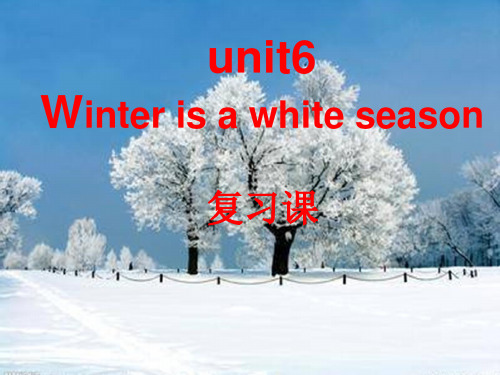
1、farm the land 2、go camping
种地 野营
3、look at the flowers
看花
4、fly kites
5、plant rice
放风筝 种水稻
6、在海滩上玩 7、找贝壳 8、摘苹果 9、喂养动物 10、做雪人
play on the beach look for shells
pick apples feed the animals make a snowman
What are they doing?
They are flying kites. They are farming the land.
They are looking at the flowers. They are going camping.
5、h_o_t
6、s_u_mm_e_r
7、ra_i_ny
8、w_i_nt_e_r
9、sn_o_w
10、_a_ntumn
fly kites
farm the land
look at the flowers
go camping
Exercises2Translate into Chinese and English
fill in the blanks.看图填空
In summer, some students
are_m_a_k_i_n_g___a__s_a_n_d_c_a_s_t.le
fill in the blanks.看图填空
In autumn, the farmers are_c_u_t_t_in_g_r_i_ce_.
It is the__h_o__tt_e_s_t__season.
人教版PEP六年级英语上册第六单元课件 (1)

How do you feel now ?
We are happy.
Let’s try
• It’s cold outside. Sam and Sarah is talking. Listen and circle.
1. Where are they?
A. At home.
B. At school
Homework
• 熟记本课时对话内容,并进行听音模仿。
Unit 6 How do you feel ?
第四课时 Part B Let’s learn
&Play card games
angry
happy
afraid sad
worried
angry
sad afraid
happy
worried
A
Tutu and Xiaomei _a_r_e_ happy.
They __a_r_e__ happy.
She is
He is angry .
[ˈæŋgri]
The bird is
The dog is ill . Angala is sad .
生病的
[sæ d]
Cindy is worried .
• 4. A:I am so angry. What should I do? B:You should ___t_a_k_e_a_d_e_e_p__b_reaanthd __c_o_u_n_t_t_o_t_en.
What should I do?
see a doctor
sad
do more exercise
How do you feel? I’m sad
He should see a doctor.
牛津版小学英语六年级第二模块第六单元第一课时课件

40
Listen, speak and fill
Would you like to have one?
a book
a country an e-friend
Listen, speak and fill
Would you like to have one? Yes, I'd like to have an e-friend in the US.
Crack the word
Do you have any _e__-_f_ri_e_n__d_s__ in other _c_o_u__n_t__ri_e__s_?
Listen and answer
Where are Joe's and Jill's e-friends from?
Listen and answer
family
sch?ool
Kitty's e-friend
favourite subjects
hob?bies
I'd like to know about his or her_f_a_m__il_y__a_n__d__h_o_b__b_i_e_s_.
Think and say
Listen and answer
What _w_o__u_l_d__ you__li_k_e_ t__o_ know about him or her?
I'd like to know about his or her family and hobbies.
Listen and follow
What about you, Kitty? I d__o_n_'_t__ havea_n__y_ e-friends.
人教PEP版六年级英语上册Unit6 B read and write课件
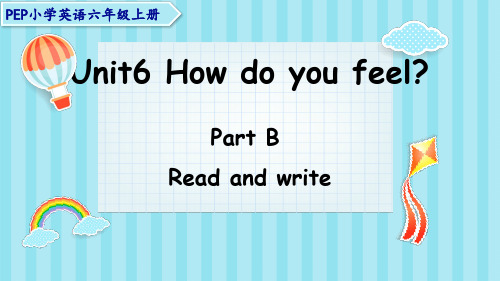
The next day. The duck drops(掉进) into a hole.__H_e_’_s__w_o_r_r_ie_d__. He shouts(大叫): ”Help.” The chick says: ”_D_o_n_’t__w_o_r_r_y_._L_e_t__m_e__h_e_l_p__y_o_u_”.
Don’t
, little ant.
worry 担心;担忧 v.
worried 担心的;担忧的
adj.
Don’t
. 别担心。
Don’t be
.
Language point
Don’t worry . I won’t sit on you.
爆破音(即/b/、/p/、/d/、/t/、/g/、/k/) 第一个爆破音只形 成阻碍,不爆破,即不发音,稍微停顿,快速过渡到下个音节。 这种只有阻碍形成而无爆破的现象被称为失去爆破现象。
They __pu_l_l _R_o_b_in__o_u_t _o_f__th_e__m_u_d_. • Everyone _i_s_h_a_p_p_y_.
Let’s retell
When Where Who What
How Result
a sunny morning
on the grass
Robin and the ant Robin is going to sit on
one ant Do yomuantyhainntks :
small
小学六年级英语复习课《动词:实义动词(行为动词)》精品教学课件
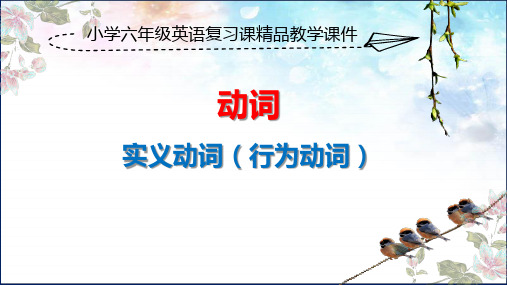
8. wash ________
9. clean ________
10.pass ________
11. play ________
12. put ________
பைடு நூலகம்
(二) 写出下列动词的现在分词形式。 1.swim ________ 2.die ________ 3.fly ________ 4.see ________ 5.write ________ 6.sing ________ 7.say ________ 8.run ________ e ________ 10.jump ________ 11.ski ________ 12.talk ________
1.及物动词必须带宾语,表示动作的对象。如: I like music.我喜欢音乐。
2.不及物动词不能直接跟宾语或不需要带宾语。如: Birds can fly.鸟会飞。
3.大多数实义动词既可作及物动词,又可作不及物动词。如: He speaks Chinese well.他汉语说得很好。(speak作及物动词) He speaks too fast.他说得太快。(speak作不及物动词)
5.他常常在学习上帮助我。 He usually ________ me with my lessons.
6.我通常在晚上六点钟吃晚饭。 I usually ________ ________ at 6 o'clock in the evening.
感谢聆听
三、用括号内所给单词的适当形式填空。 1.The boys ________ (play) football now. 2.He usually ________ (have) lunch at school.But yesterday he ________ (have) lunch at home. 3.Lucy ________ (like) bananas very much. 4.Look! She ________ (dance) in the classroom. 5.Do you like ________ (take) photos? 6.Lily is good at ________ (sing). 7.Nick ________ (not go) to the zoo last Sunday. 8.We ________ (not watch) TV on Mondays. 9.What ________ they ________ (do) next Saturday? 10.Tina and I ________ (take) a walk yesterday evening.
小学六年级英语复习课《感叹句》精品教学课件
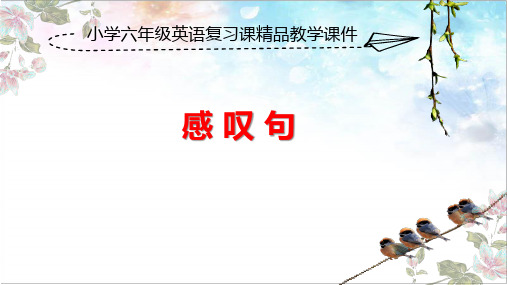
A.How
B.What a
( )5.—Look at the students.
—________ excited (兴奋的)!
A.What a
B.What an
C.How a C.What a
C.You're C.What
C.How
( )6.________ fast the car is running!
________ ________ food! 5.The news is sad.(改为感叹句) ________ sad the news ________! 6.How beautiful the city is!(改为同义句)
________ a ________ city it is! 7.How dirty the bedroom is!(改为同义句)
四、按要求完成下列句子。 1.It's a lovely dog.(改为感叹句)
________ ________ lovely dog it is! 2.They are magic clothes.(改为感叹句)
________ ________ clothes they are! 3.The film is very interesting.(改为感叹句) ________ interesting the film ________! 4.The food is yummy.(改为感叹句)
课堂过关训练:
一、用What或How填空。 1.________ a good boy! 2.________ beautiful pictures they are! 3.________ happy the children are! 4.________ boring the film is! 5.________ bad rice it is! 6.________ time flies! 7.________ well the boys are singing! 8.________ a cheap skirt it is! 9.________ hard the work is! 10.________ hard work it is!
最新PEP人教版六年级英语上册新版PEP六年级上册unit6_A_lets_talk课件
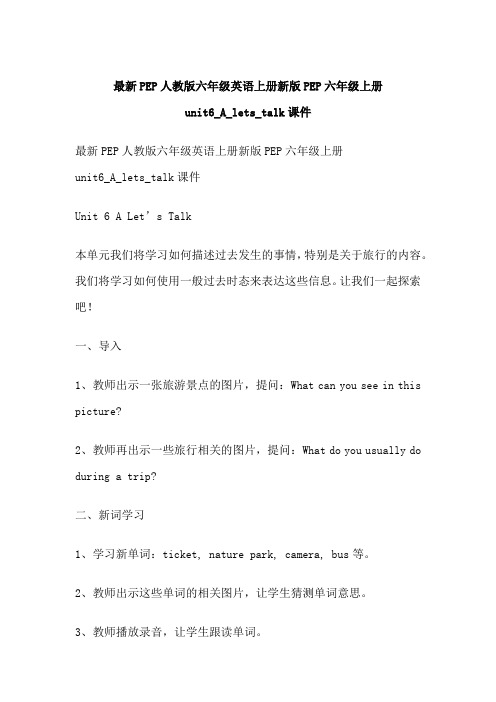
最新PEP人教版六年级英语上册新版PEP六年级上册unit6_A_lets_talk课件最新PEP人教版六年级英语上册新版PEP六年级上册unit6_A_lets_talk课件Unit 6 A Let’s Talk本单元我们将学习如何描述过去发生的事情,特别是关于旅行的内容。
我们将学习如何使用一般过去时态来表达这些信息。
让我们一起探索吧!一、导入1、教师出示一张旅游景点的图片,提问:What can you see in this picture?2、教师再出示一些旅行相关的图片,提问:What do you usually do during a trip?二、新词学习1、学习新单词:ticket, nature park, camera, bus等。
2、教师出示这些单词的相关图片,让学生猜测单词意思。
3、教师播放录音,让学生跟读单词。
三、对话学习1、教师出示对话图片,让学生了解对话背景。
2、教师播放对话录音,让学生了解对话内容。
3、教师带领学生逐句学习对话,并解释生词和语法。
4、教师让学生模仿对话,进行口语练习。
四、语言运用1、教师出示一张旅行计划表格,让学生用一般过去时态描述表格中的活动。
2、教师让学生模仿对话中的句型,描述自己的旅行经历。
五、作业1、背诵本单元新单词和对话。
2、用一般过去时态描述一次自己的旅行经历。
六、总结本单元我们学习了如何使用一般过去时态描述过去发生的事情,特别是关于旅行的内容。
我们要掌握相关单词和句型的用法,并能够运用到实际生活中。
英语人教版六年级上册新版pep小学英语六年级上册第一单元课件英语人教版六年级上册新版pep小学英语六年级上册第一单元课件Welcome to Unit 1 “How can I get to the library?”Section A1、词汇掌握与运用掌握以下单词的拼写和意义:1、subway2、bus3、taxi4、train5、bike6、fly能够运用这些单词进行简单的英语对话和写作。
外研版六年级英语上册《Module 6 Unit 1》课堂教学课件PPT小学公开课

外研版 英语 六年级上册Module 6Unit 1 You’ve got a letter from New York.第一课时第二课时第一课时Sing a song: You’ve got …I have got...Look and say.Free talk.I have got many books.Have you got many books?What book have you got?I’ve got some books about China.I’ve got a book about the US.about 的用法小结表示“关于”。
表示“大约”。
This is a story abouttime.There’re about 40 students on the playground.Have you got a book about China?No, I haven’t.Yes, I have.Have you got a book about China?这是have 引导的一般疑问句,表示“某人有……吗?”have 要随主语的变化而变化,当主语是第三人称单数时,要用 has 。
— Have you got a pet dog?— Yes, I have./No, I haven’t.句型结构:Have/Has + 主语 + got + 其他?肯定回答:Yes, 主语 + have/has.否定回答:No, 主语 + haven’t/hasn’t.关于have /has got 的其他常用固定句式陈述句句型结构:主语 + have/has got + 其他.I have got a new bike.She has gota white dress.关于have /has got 的其他常用固定句式I haven’t got a blue T-shirt.He hasn’t got a book about Hua Mulan.否定句句型结构:主语 + have/has not got + 其他.have/has not 可以缩写为haven’t/hasn’t 。
- 1、下载文档前请自行甄别文档内容的完整性,平台不提供额外的编辑、内容补充、找答案等附加服务。
- 2、"仅部分预览"的文档,不可在线预览部分如存在完整性等问题,可反馈申请退款(可完整预览的文档不适用该条件!)。
- 3、如文档侵犯您的权益,请联系客服反馈,我们会尽快为您处理(人工客服工作时间:9:00-18:30)。
• • • •
• • • • • •
• •
July——7月 罗马统治者朱里斯*绦撒大帝被刺死后,著名的罗马将军马克*按东尼建议将绦 撒大帝诞生的7月,用绦撒的名字——拉丁文Julius(即朱里斯)命名之。这一建 议得到了元老院的通过。英语7月July由此演变而来。 August——8月 朱里斯*绦撒死后,由他的甥孙屋大维续任罗马皇帝。为了和绦撒齐名,他也 想用自己的名字来命名一个月份。他的生日在9月,但他选定8月。因为他登基后, 罗马元老院在8 月授予他Augustus(奥古斯都)的尊号。于是,他决定用这个尊 号来命名8月。訽来8月比7月少一天,为了和绦撒平起平坐,他又决定从2月中抽 出一天加在8月上。从此,2月便少了一天。英语8月August便 由这位皇帝的拉丁语尊号演变而来。 September——9月 老历法的7月,正是绦撒大帝改革历法后的9月,拉丁文Septem是“7”月的意 思。虽然历法改革了,但人们仍袭用旧名称来称呼9月。英语9月September,便 由 此演变而来。 October——10月 英语10月,来自拉丁文Octo,即“8”的意思。它和上面讲的9月一样,历法改 了,称呼仍然沿用未变。 November——11月 罗马皇帝奥古斯都和绦撒都有了自己名字命名的月份,罗马市民和元老院要求 当时的罗马皇帝梯比里乌斯用其名命名11月。但梯比里乌斯没有同意,他明智地 对大家说,如果罗马每个皇帝都用自己的名字来命名月份,那么出现了第13个皇 帝怎么办?于是,11月仍然保留着旧称Novem,即拉丁文“9”的意思。英语11 月November便由此演变而来。 December——12月 罗马皇帝琉西乌斯要把一年中最后一个月用他情妇的Amagonius的名字来命 名,但遭但元老院的反对。于是,12月仍然沿用旧名Decem,即拉丁文“10”的 意思。英语12月December,便由此演变而来。
Name Ken
spring √
summer
autMiss Wu You
•
• • • • •
• •
• •
• •
• • •
公历一年有12个月,但不少人并不知道12 个月的英语名称的来历。公历起源于古罗马历法。 罗马的英语原来只有10 个月,古罗马皇帝决定增加两个月放在年尾,后来朱里斯--凯撒大帝把 这两个月移到年初,成为1月.2月,原来的1月.2月便成了3月.4月,依次类推。这就是今天世界 沿用的公历。 January——1月 在罗马传说中,有一位名叫雅努斯的守护神,生有先后两副脸,一副回顾过去,一副要眺 望未来。人们认为选择他的名字作为除旧觃新的第一个月月名,很有意义。英语 January,便是由这位守护神的拉丁文名字January演变而来的。 February——2月 每年2 月初,罗马人民都要杀牲饮酒,欢庆菲勃卢姆节。这一天,人们常用一种牛、草制 成的名叫February的鞭子,抽打不育的妇女,以求怀孕生子。这一天,人们还要忏悔自己过 去一年的罪过,洗刷自己的灵魂,求得神明的饶恕,使自己成为一个贞洁的人。英语2月 February,便是由拉丁文Februar-ius(即菲勃卢姆节)演变而来。 March-----3月 3月,原是罗马旧历法的1 月,新年的开始。绦撒大帝改革历法后,訽来的1月变成3月, 但罗马人仍然把3 月看做是一年的开始。另外,按照传统习惯,3月是每年出征远战的季节。 为了纪念战神玛尔斯,人们便把这位战神的拉丁名字作为3月的月名。英语3月March,便是由 这位战神的名字演变而来的。 April——4月 罗马的4月,正是大地回春.鲜花初绽的美好季节。英文4月April便由拉丁文April(即开花的日 子)演变而来。 May——5月 罗马神话中的女神玛雅,专门司管春天和生命。为了纪念这位女神,罗马人便用她的名 字——拉丁文Maius命名5月,英文5月May便由这位女神的名字演变而来。 June——6月 罗马神话中的裘诺,是众神之王,又是司管生育和保护妇女的神。古罗马对她十分崇 敬,便把6月奉献给她,以她的名字——拉丁文Junius来命名6 月。英语6月June便由这位女 神的名字演变而来。也有学者认为,Junius可能是个代拉丁家族中一个显赫贵族的姓氏。
• • • • • • •
• •
January May Septemper 2. • • • • • • • •
February June October
March July November
April August December
Can you answer the questions? ① This month starts with an “M”. It has five letters. It’s . This month usually only has 28 days. But sometimes it has 29 days. It’s . It is very cold in these months. You can play in the snow. They are . These months have 31days. They are February is the second month of a year. is the five month and is the last month.
小学英语 斜滩中心小学 吴海兰
January May Septemper
February June October
March July November
April August December
1. Can you put the months in the boxes?
Do you know?
• • • 一年四季的划分 1.天文划分法 从天文现象看,四季变化就是昼夜长短和太阳高度的季节变化。在一年中,白昼最 长、太阳高度最高的季节就是夏季,白昼最短、太阳高度最低的季节就是冬季,冬、 夏两季的过渡季节就是春、秋两季。为此,天文划分四季法,就是以春分(3月21 日)、夏至(6月21日)、秋分(9月21日)、冬至(12月21日)作为四季的开始。即:春 分到夏至为春季,夏至到秋分为夏季,秋分到冬至为秋季,冬至到春分为冬季。 2.气象划分法 在气象部门,通常以阳历3~5月为春季,6~8月为夏季,9~11月为秋季,12月~ 来年2月为冬季,并且常常把1、4、7、10月作为冬、春、夏、秋季的代表月份。 3.古代划分法 以立春(2月4日或5日)作为春季开始,立夏(5月5日或6日)作为夏季开始,立秋(8月 7日或8日)作为秋季开始,立冬(11月8日或9日)作为冬季开始。 4.农历划分法 我国民间习惯上用农历月份来划分四季。以每年阴历的1~3月为春季,4~6月为夏 季,7~9月为秋季,10~12月为冬季。正月初一是全年的头一天,也是春天的头一 天,所以又叫春节。 上述几种方法虽然简单方便,但有一个共同的缺点,就是全国各地都在同一天进 入同一个季节,这与我国各地区的实际情况是有很大差别的。例如,按照上述划分 方法,3月份已属春季,这时的长江以南地区的确是桃红柳绿,春意正浓;而黑龙 江的北部却是寒风凛冽,冰天雪地,毫无春意;海南岛的人们则已穿单衣过夏天了。 为使四季划分能与各地的自然景象和人们生活节奏相吻合,气象部门采取了候温划 分四季法。 5.候温划分法 这种划分法是以候(五天为一候)。平均气温作为划分四季的温度指标。当候平 均气温稳定在22℃以上时为夏季开始,候平均气温稳定在10℃以下时为冬季开始, 候平均气温在10~22℃之间为春秋季。从10℃升到22℃是春季,从22℃降到10℃是 秋季。
3.
Read and check.
Ken’s birthday is March 12th. Ann’s birthday is September 19th. Mocky’s birthday is October 25th. Miss Wu’s birthday is September 10th.
January
December
Feburary March
November
October
Month
April
September
May August June
July
spring
winter
season
summer
autumn
